|
|
|
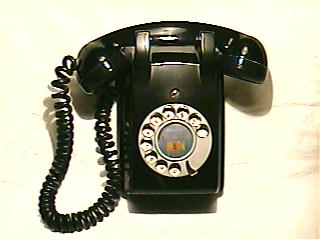
|
Connecticut Wall Phone -- An adorable little unit with
bakelite case and soft plastic handset. Base measures only
5¼w
x 7½h x 3¾d. The dial is an AE, with the
fingerwheel
pained gray (rarely seen). There's no network or coil inside, and
the number card reads "Connecticut Private Line", so it was not
intended
for the public network. However there are terminals inside marked
L1, L2 and G. When connected to a CO line, it dials out and rings
just fine. Click for details. Marked on back: Part No. 6305, 60 Cycles, July 17, 1956 |
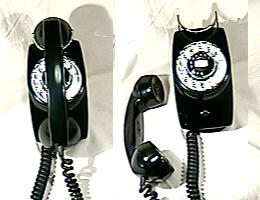
|
OKI -- DAW-101, 1960. Case is only about
7" high. Interesting nickeled hanger for handset. Marked OKI on dial plate , fingerwheel, case and handset.
Case has an applied metal diamond-shaped logo, with blue enamel
background.
 |
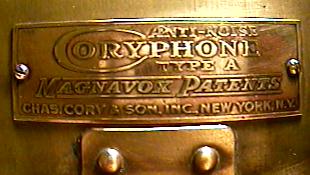 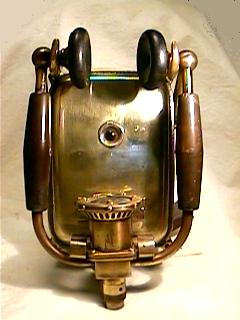 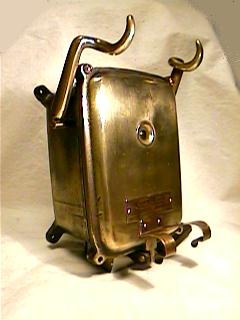
|
Coryphone Type A -- Anti-noise marine telephone made
under Magnavox patents by Charles Cory & Son, Inc, New York, NY.,
ca. 1920s. This model is made of brass, for shipboard use.
It is 6"w x 8 1/2" h x 5"d, weighs about 25 pounds and has a 1 1/2"
threaded fitting for the conduit. The "electro-dynamic" receiver, with it's large horseshoe-shaped permanent magnets is in the body of the phone. Sound was conducted to the handset through a large flexible tube. The wires for the transmitter were woven into the tube's wall. 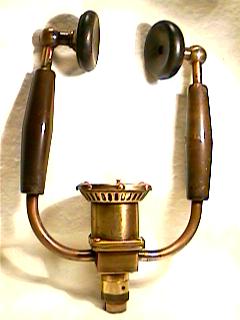 The handset has an earpiece for each ear and a transmitter that admits background noise on both sides of the diaphragm to help cancel it out. Springs near the transmitter make it possible to hold the handset with one hand. The handset hooks are the most substantial I have ever seen, and look like they could be dangerous on a rolling deck. Magnavox literature touts the transmitter's successes in noisy
environments: "If
your noise conditions are bad, Magnavox telephones will overcome them,
even as they overcame the thunder of the Liberty motors on American
airplanes during the war [WWI]. ... The racket of
riveting hammers in a shipyard, or on a steel-frame building outside
your office window, has no effect whatever on it. A stamp mill in
full blast is no place for an ordinary telephone, but a
Magnavox anti-noise instrument will work perfectly there. Other
places where it will earn a welcome are: newspaper composing rooms and
press rooms; knitting and spinning mills; machine shops;
pipe works; garages; sawmills and planing mills; shingle plants;
locomotive works; cotton gins; railroad yards; steam or electric
foundries, power plants and gas works; blast furnace plants; and sheet
metal works. These will suggest others. |
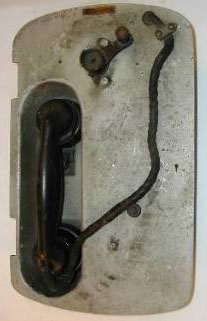 |
Western Electric Callbox
Phone Unmarked. Small tag on top "Patent Applied for." "Z40" cast into baseplate. Goes in a large cast metal enclosure. Probably used by the
beat policeman to report in or in a fire call box. This one looks
like it would fit a Gamewell box. The lever activates a fascinating clockwork mechanism that
generates the box location code. Click for
details. |
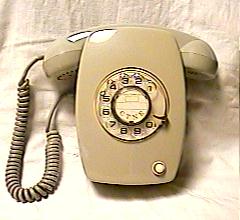 |
SPANISH "HERALDO" WALL PHONE -- Interesting rounded
styling on base and handset. The ringer gongs are
concentrically mounted with a clapper that strikes at an odd
angle. Has a wiring diagram
inside. Works great in the U.S. Marked
"APA-52.901-SNA-K, S-400.335, NO ECUALIZADO" and dated 4-71
inside. Produced from the early 60s thru 90s for CTNE, Compañía Telefónica Nacional de España. While most were gray, cyan, red and ivory were also available. The white button is a transfer call button ("botón de transferencia"). (Thanks Bill and Leila! -- They brought it from Spain as a gift when they came for a visit. Thanks also to Eduardo for background info on this phone!) |
| DE VEAU -- Wall intercom with watch case receiver, bakelite mouthpiece and nickeled bells on top -- marked "DeVeau" on transmitter and receiver. |

